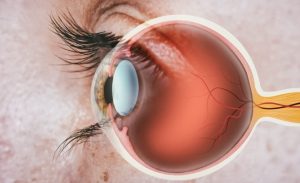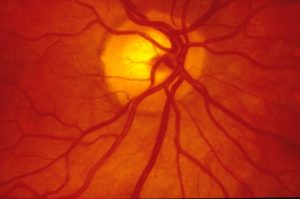Central Serous Retinopathy Treatment in Baltimore
 Central serous (chorio) retinopathy, also known as CSC (or CSR), is one of the most common types of retinopathy behind diabetic retinopathy, macular degeneration and branch retinal vein occlusion. CSC/CSR tends to affect more men than women. The condition causes fluid to accumulate under the retina, creating a serous (fluid-filled area) that elevates and separates the retinal tissue from the back of the eye (retinal detachment). This, in turn, leads to central vision loss or distortion.
Central serous (chorio) retinopathy, also known as CSC (or CSR), is one of the most common types of retinopathy behind diabetic retinopathy, macular degeneration and branch retinal vein occlusion. CSC/CSR tends to affect more men than women. The condition causes fluid to accumulate under the retina, creating a serous (fluid-filled area) that elevates and separates the retinal tissue from the back of the eye (retinal detachment). This, in turn, leads to central vision loss or distortion.
Our retinal specialists at Elman Retina Group in Rosedale offer central serous retinopathy treatment for patients struggling with chronic vision loss.
CSC is typically a temporary vision problem but can reoccur and become chronic. The most common symptoms are blurry central vision, distorted images, a dark area in the middle of the visual field, dimmed or dulled colors and straight lines that appear crooked or bent. Men in their 30s to 50s seem to be most at risk for central serous retinopathy. Those with a history of steroid use, autoimmune disease, sleep disturbances or hypertension may be more likely to develop CSC. Stress is also a significant risk factor for CSC.
Diagnosing Central Serous Retinopathy
Dr. Elman, Dr. Schechet and Dr. Dao can diagnose CSC with pupil dilation during a comprehensive eye exam. Retinal photographs taken of the retina can document the disease and help our eye doctors determine the exact issue. Many retinal conditions can affect central vision, and a correct diagnosis is key to treatment and management.
 Optical coherence tomography (OCT) is another test that scans the retina for proper diagnosis. OCT scans give our eye doctors a microscopic view of the retinal tissue so they can identify small fluid pockets or scar tissue. Fluorescein angiography can further help CSC diagnosis and involves injecting a dye into the arm vein that travels to the retina. Pictures of each eye show how the dye is dispersed and identify where it leaks under the retina.
Optical coherence tomography (OCT) is another test that scans the retina for proper diagnosis. OCT scans give our eye doctors a microscopic view of the retinal tissue so they can identify small fluid pockets or scar tissue. Fluorescein angiography can further help CSC diagnosis and involves injecting a dye into the arm vein that travels to the retina. Pictures of each eye show how the dye is dispersed and identify where it leaks under the retina.
These various tests help our retinal specialists make the correct diagnosis and distinguish central serous retinopathy from other retinal diseases that cause fluid buildup in the macula.
Central Serous Retinopathy Treatment
Some patients don’t require treatment and their vision heals on its own within a few months. CSC patients on corticosteroids need to safely discontinue the medication as soon as possible to aid healing. When treatment is necessary to restore vision and improve other symptoms, thermal laser treatment, eye drops, oral medicine and/or eye injections can effectively treat chronic cases of CSC.
Photodynamic therapy is a “cold laser” treatment that may manage chronic CSC by treating the source of the fluid leakage. The laser treatment involves injecting the drug verteporfin into the arm and activating it when it reaches the eye with a special cold laser. Photodynamic therapy may prevent central serous retinopathy from coming back in some patients.
Whether treatment is necessary and which is best depends on the severity of CSC and symptoms. Patients with reoccurring CSC are more likely to require treatment. If our eye doctors look at the retina and find evidence the liquid is going away, they may recommend waiting to see if CSC resolves itself. Persistent leakage and severe vision loss require treatment to stop the leak and restore good eyesight.
If you are experiencing signs of central serous retinopathy, contact Elman Retina Group in Rosedale, Maryland, today to schedule a comprehensive eye exam and discuss treatment options. Call our eye doctors at (410) 686-3000 or fill out our online contact form.



